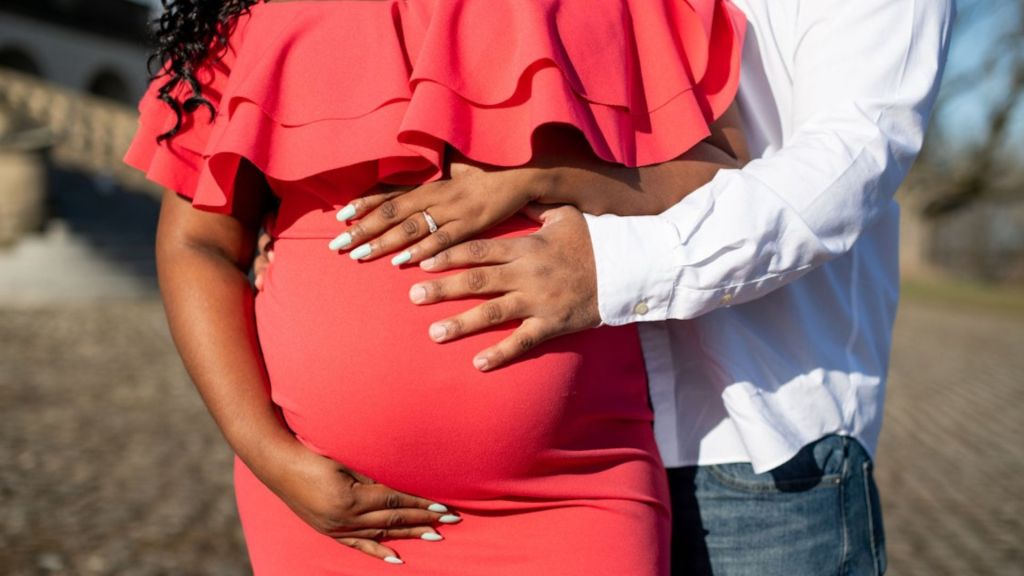By Tashi McQueen
AFRO Staff Writer
tmcqueen@afro.com
Despite systemic barriers and everyday challenges, many Black couples continue choosing love.

Photo Credit: Nappy.Co Photo/Alyssa Sieb
“Black love is powerful. It’s rooted in strength, resilience and joy,” said April Lancit, assistant professor and licensed couple and family therapist for La Salle University. “When nurtured with intention, understanding and mutual respect, it creates relationships that don’t just last but flourish.”
Despite financial struggles, lack of connection and communication issues, many Black couples stay together. Tabitha Brown, actress and best-selling author, and her husband of over 25 years, Chance Brown, have worked through these challenges.
On their podcast “Fridays with Tab and Chance,” they shared how they stayed committed.
“There were times that we stayed together because we couldn’t survive without each other,” said Tabitha Brown in an Aug. 8, 2024, episode.
Brown said at one point it was that she couldn’t afford to leave her marriage so she had to stay and work it out.
“Throughout that time, we just fell back in love,” she said.
In order to maintain a strong marriage, the Browns advised avoiding temptation.
“I always made sure I had a small circle of people, and that I did not go to places where I did not feel like a married man should frequent,” said Chance Brown.
Lancit spoke about challenges unique to Black couples.
“The intersection of race, class, gender and equality continues to shape how Black couples navigate their relationships today,” she said. “Many don’t realize how these intersections influence how they show up or don’t show up in their partnerships.”
She shared that generational experiences, societal narratives and cultural expectations shape beliefs about communication, attachment and intimacy.
“Recognizing these patterns gives Black couples the power to redefine their relationships on their own terms, rejecting outdated norms and building partnerships that reflect both love and liberation,” she said.
Lancit noted that Millennials and Gen Z are reshaping Black love.
“They are prioritizing mental and emotional wellness in ways that weren’t always accessible before,” she said. “They are leaning into therapy, emotional intelligence and self-awareness.”
Breaking generational trauma starts with awareness.
“Black couples who want to heal together must first understand how trauma has shaped their relationships from childhood experiences to inherited beliefs about love, trust, and emotional safety,” said Lancit. “Creating a safe space for open, honest conversations is crucial.”
She encouraged couples to seek professional support.
“Seeking professional support, such as couples therapy or coaching, can be a game-changer,” she said. “Therapy isn’t about ‘fixing’ a broken relationship; it’s about giving couples the tools to strengthen, deepen, and sustain the love they are building.”
Dr. Noelle Chappelle, president of Ascension Counseling, a group of relationship experts and trauma specialists, shared strategies for Black couples to help them be resilient.
“The first strategy is creating and maintaining healthy boundaries between the relationship and everyone else outside of it, including parents and children,” Chappelle said.
Lancit said the second strategy is for couples to model the behavior they want from their partner.
“This includes speaking to them gently and respectfully,” said Chappelle.
The third strategy is ensuring shared values and honoring each other’s dreams and goals.
Lancit believes today’s couples are creating a new legacy.
“One where Black love is not just about survival, but about thriving, evolving and celebrating joy unapologetically,” she said. “Resilient Black couples are doing the deep inner work, having real, raw and vulnerable conversations, moving away from silence and towards intentional partnership.”
The post Black love in the modern era: Prioritizing healing, communication and growth appeared first on AFRO American Newspapers.










